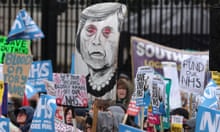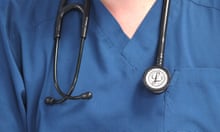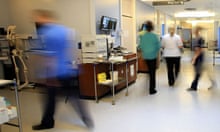About 12,000 doctors trained in European countries could quit the UK because they feel less welcome following the Brexit vote, according to a survey of overseas medics.
About two in five doctors who qualified in European Economic Area countries are considering leaving the UK in light of the referendum result, research by the British Medical Association reveals.
The findings prompted alarm about an impending “disaster” in medical staffing and fears that an exodus of EEA doctors could exacerbate already significant personnel shortages in NHS hospitals.
The BMA’s findings are based on a survey it undertook of 1,193 EEA doctors working in the UK. When asked if they were thinking about leaving the UK following last year’s referendum vote, 500 (42%) said yes, 309 (26%) said no, 278 (23%) were unsure, while the other 106 did not answer.
“These are the people who staff our hospitals and GP surgeries, look after vulnerable patients in the community, and conduct vital medical research to help save lives. Many have dedicated years of service to healthcare in the UK, so it’s extremely concerning that so many are considering leaving,” said Dr Mark Porter, the BMA’s council chair.
“At a time when the NHS is already at breaking point and facing crippling staff shortages, this would be a disaster and threaten the delivery of high-quality patient care. But this isn’t just about numbers. The quality of patient care is improved where doctors have diverse experiences and expertise,” he added.
The EEA includes the 28 members of the European Union plus Norway, Iceland and Liechtenstein.
Figures from the General Medical Council, which regulates the medical profession, show that there are 280,932 doctors on the medical register. Of those, 177,912 (63%) were trained in the UK, 30,733 (11%) qualified in another EEA country and 72,287 (26%) are from elsewhere in the world.
“While thousands of overseas and EU doctors work across the UK to provide the best possible care for patients, many from the EU are left feeling unwelcome and uncertain about whether they and their families will have the right to live and work in the UK after Brexit,” said Porter.
European doctors feel significantly less appreciated by the UK government now than before the referendum. Their average rating on that score has fallen from seven out of ten before the vote to leave the EU to less than four out of ten now.
Similarly, they also feel a lot less committed to working in the UK since the Brexit vote. Their average rating on that question has fallen from nine out of ten before the referendum to six out of ten.
“Since the result of the EU referendum I feel increasingly uncertain about my future here, and am considering returning to Germany. It is unsettling that in a country that I have contributed to for 20 years and consider home, I am now seen as a foreigner and have to prove that I deserve to live and work here,” said Dr Birgit Woolley, a German-born GP who has worked in Britain for 20 years.
“I feel supported by my patients, with even those that voted leave telling me: ‘You can stay because you’re a doctor. We like you. We didn’t mean you.’ But the reality is that the government does not appreciate what EU nationals like me have contributed to the UK, and only sees us as bargaining chips.”
Luciana Berger, a Labour member of the Commons health select committee, said: “These extremely worrying BMA figures show the huge contribution made by doctors from the EU, and the severe risk that hundreds will leave the UK as a direct result of Brexit.”
A Department of Health spokesman said: “As the government has repeatedly made clear, overseas workers form a crucial part of our NHS and we value their contribution immensely.
“We want to see the outstanding work of doctors and nurses who are already trained overseas continue, but at the same time we have been very clear that we want to give more domestic students the chance to be doctors, given the enduring popularity of this as a career.”









